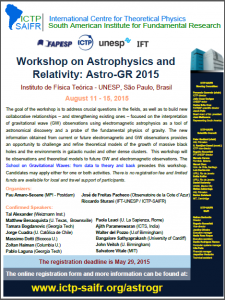Workshop on Astrophysics and Relativity: Astro-GR 2015
Start time: August 11, 2015
Ends on: August 15, 2015
Location: São Paulo, Brazil
Venue: IFT-UNESP
Organizers:
- Pau Amaro-Seoane (MPI – Potsdam)
- José de Freitas Pacheco (Observatoire de la Cote d´Azur)
- Riccardo Sturani (IFT-UNESP / ICTP-SAIFR)
Confirmed speakers:
- Tal Alexander (Weizmann Institute): Dynamically triggered supra-exponential growth of black hole seeds in the early universe
- Pau Amaro-Seoane (MPI – Potsdam): The_astrophysics_of_emris_Capture_of_compact_objects_by_SMBHs
- Matthew Benacquista (University of Texas at Brownsville): Prospects for observing dynamically formed stellar mass black hole binaries with gravitational waves
- Tamara Bogdanovic (Georgia Tech): Can star-disk_collisions_explain_the missing_red_giants_problem_in_the_galactic_center
- Jorge Cuadra (Pontificia Universidad Católica de Chile): Gas_dynamics_and_SMBH_accretion_in_the_Galactic_centre
- Massimo Dotti (Bicocca University): Do MBH binaries coalesce?
- Zoltan Haiman & Daniel J. D’Orazio (Columbia University): Hydrodynamics of circumbinary disks and corresponding binary signatures
- Pablo Laguna (Georgia Tech): Stellar tidal disruptions for dummies
- Paola Leaci (U. La Sapienza, Rome): New prospects by the Advanced LIGO-Virgo Detector Network
- Ajith Parameswaran (International Centre for Theoretical Sciences): Measuring the energy and angular momentum lost by binary black holes into GWs
- Walter Del Pozzo (University of Birmingham): Testing General Relativity with GWs
- Bangalore Sathyaprakash (University of Cardiff): Undreamt by Einstein: Prospects in GW Astronomy and challenges
- Deirdre Shoemaker (Georgia Tech): From NR to GWs for BBHs
- John Veitch (University of Birmingham): Extracting astrophysics of neutron stars from compact binary GW observations
- Salvatore Vitale (Massachussets Institute of Technology): What can GWs tell us about black holes?
Description:
The goal of the workshop is to address crucial questions in the field, as well as to build new collaborative relationships – and strengthening existing ones – focused on the interpretation of gravitational wave (GW) observations using electromagnetic astrophysics as a tool of astronomical discovery and a probe of the fundamental physics of gravity. The new information obtained from current or future electromagnetic and GW observations provides an opportunity to challenge and refine theoretical models of the growth of massive black holes and the environments in galactic nuclei and other dense clusters. Refinements in these models will have direct consequences for the expected science that can be done with GW observatories. This workshop will tie observations and theoretical models to future gravitational-wave and electromagnetic observations.
The workshop will address the following subjects:
1. Astrophysical environments which allow black holes to form, grow, collide, and merge, the determination of their electromagnetic counterparts for multi-messenger astrophysics covering electromagnetic and gravitational radiation.
2. Dynamics of galactic nuclei: Impact on massive black hole growth and distribution of stars around them, creation of X-ray/UV flares by stellar tidal disruptions and formation of gravitational wave sources, for ground and space-borne detectors.
3. The formation of intermediate-mass black holes in globular clusters and the interplay with the stellar environment: ultra-luminous X-ray sources (ULRX), capture of compact objects by the IMBH, “intermediate-mass ratio inspirals” (IMRIs), and the creation of IMBH binaries as a powerful source of GWs for ground- and space-borne detectors.
4. Gravitational wave detections from ground-based observatories will open a new window on the astrophysics of binary systems containing black hole from a few to a few hundred solar masses. Waveform modelling is sufficiently accurate to enable the reconstruction of the precessional dynamics allowing to determine, for instance, if tidal interactions or mass ratio reversal play a role in binary system formation.
The School on Gravitational Waves: from data to theory and back precedes this workshop. Candidates may apply either for one or both activities.
In order to have an idea of the former workshops, please visit the home-page Astro-GR: the original idea of the meetings
Announcement
List of Participants: Updated on July 30
Photos:
Workshop Program:
List of Questions for ASTRO-GR
Videos:
- 11/08
- 12/08
- 13/08
- 14/08
Additional Information:
Registration: ALL participants should register. The registration will be on August 11 at the institute from 12:45 to 14:00. You can find arrival instruction at http://www.ictp-saifr.org/?page_id=195
BOARDING PASS: All participants, whose travel has been provided or will be reimbursed by the institute, should bring the boarding pass upon registration, and collect an envelope to send the return boarding pass to the institute.
Accommodation: Participants whose accommodation has been provided by the institute will stay at The Universe Flat. Each participant whose accommodation has been provided by the institute has received the details on the accommodation individually by email.
Emergency number: 9 8233 8671 (from São Paulo city); +55 11 9 8233 8671 (from abroad), 11 9 8233 8671 (from outside São Paulo).
Ground transportation instructions:
Ground transportation from Guarulhos Airport to The Universe Flat
Ground transportation from Congonhas Airport to the Universe Flat
Ground transportation from The Universe Flat to the institute

